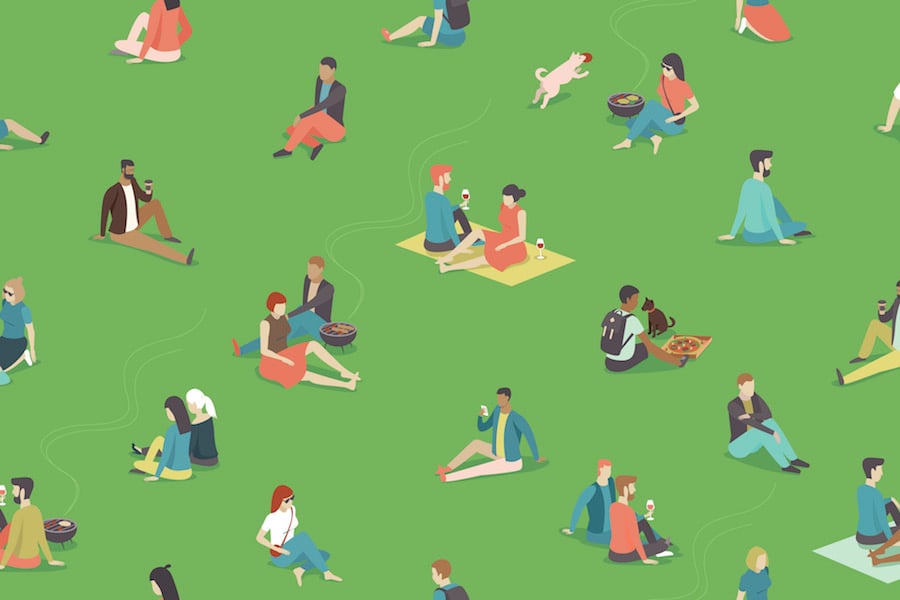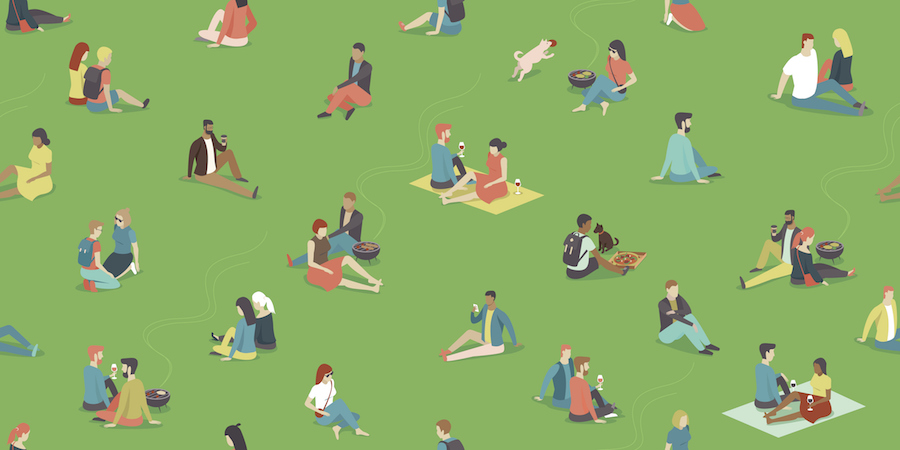

When Erika returned to her small Ontario town after her second year at the University of Ottawa, she was part of the group of young people during COVID-19 to return to work as a grocery store worker.
That was back in mid-March, when the province locked down in response to the pandemic. During that time, Erika says she had no choice but to make her social bubble her co-workers, who she didn’t know that well. When restrictions lifted to allow for a 10-person social bubble, Erika had to decide whether to expand her circle past the recommended 10-person limit.
“One thing I realized is that young people are not trying to be irresponsible; it’s that we work the jobs in places everybody wanted to reopen really quickly,” she explains. “It’s a question of, how do you manage the professional bubble and the social, outside-of-work bubble?”
This decision became even more dire when she returned to Ottawa for school in September. She moved into a house with roommates she didn’t know well.
“I didn’t go out and see my friends in responsible ways. I’d just be completely isolated through and through,” she says. “I wouldn’t see anybody in person, because my classes are online.”
Young people have, perhaps unfairly, become scapegoats for any increase in new COVID-19 provincial cases, ever since the 20-39 age demographic started to make up the largest percentage of new infections.
As of Thursday, 63 per cent of new cases were in people under the age of 40.
Premier Doug Ford has pleaded with young people during multiple COVID-19 press conferences over the past months to “rein in” the partying.
But young people who haven’t been following social gathering and bubble restrictions as strictly say they’re not doing it because they don’t care or don’t know the risks.
They are often making calculated choices after weighing the comparative risks of not seeing anyone at all.
Being cut off from almost all socializing takes a toll on mental health, increasing loneliness and affecting mood and anxiety. Most young people are hearing the messages from public health officials, and understand the risks. But telling them what not to do and shaming and blaming isn’t work for everyone, especially when so many feel they must to push the boundaries of social restriction rules for their own well-being.
Some names in this story have been changed for privacy reasons.
Mental health during COVID-19
Noam, a 23-year-old living in Vaughan with her family, says hanging out in larger groups when restrictions eased had to do with “getting out of her own head.”
“From March to about May, it was just terrible. I feel like I crave interaction with my friends and not even people that I know, literally anyone in general,” she says. “I had to learn how to be with myself.
“There were a lot of internal thoughts and feelings that I held in for a really long time that I had to learn how to deal with. And I had a lot of time to overthink, which wasn’t great for me,” she adds.
In April, Joanna Henderson, director of the Margaret and Wallace McCain Centre for Child, Youth & Family Mental Health at Centre for Addiction and Mental Health (CAMH) conducted a study of 600 people ages 14 to 27. She found young people perceived their own mental health to have deteriorated during COVID-19.
Of those who had previously sought mental health support, more than two thirds reported significant problems with depression, anxiety and other mental health struggles. Of those who had not previously sought support, just under 40 per cent reported those problems.
“They’re definitely feeling loneliness, boredom, socially isolated and feeling anxious about the things young people are developmentally supposed to be doing . . . connecting to friends or exploring intimate relationships,” Henderson says.
Noam has a heart condition and had to have heart surgery in July. This makes her more vulnerable if she were to contract the virus. But she says when friends started to invite her to social gatherings, she just assumed everything would be fine.
“I don’t normally have that sense of FOMO, fear of missing out,” she says. “After being at home and isolated and lonely for so many months, I craved that. As soon as people started doing things, I was ready to do anything at that point.”
Now that daily case numbers have started to rise again, Noam says she’s more worried and cautious, especially after a friend she went to a patio with told her that her brother had tested positive for COVID-19. Luckily, Noam’s own test came back negative.

Shaming young people is missing the mark
Noam gets why Ford has been targeting young people in his announcements.
“There’s a huge bunch of people my age that are going to house parties or people’s condos,” she says. “I think he’s right when he’s telling young people to relax a bit.”
Lisa is a 38-year-old who lives alone in Toronto. She says Ford calling out young people shows a lack of empathy for their life situations.
“There are a lot of young people who are living with roommates, living in cramped quarters. And when you’re young, your social circle is so important in a way that it isn’t maybe for people of his age,” she says. “If you have a family and you have kids, sure, maybe going to a bar isn’t as important to you. But if you have chosen to live in a different way, then going to a restaurant might be an important thing in your life.”
Henderson says focusing on young people as the problem isn’t an effective way for public health officials to communicate about COVID-19.
“It’s not just the communication of the information, it’s the decision making when you have these complex, competing priorities,” she says, adding young people should be consulted as part of pandemic response initiatives.
“We’re asking young people to make really complex decisions that weigh things like the health of their family and friends and themselves and public health against their mental health and the importance of social connection,” Henderson adds.
Wendy Ellis, an associate professor of psychology at King’s University College, has published research into the habits of 1,000 Ontario teenagers during the pandemic. She says the shame tactic is probably not the most effective way to communicate with young people.
“You want to grant them the autonomy to make their own decisions,” she says. “Instead of saying, ‘This is what you can’t do,’ it’s having a discussion to say, ‘This is what you can do safely and here’s some ideas,’ rather than just strictly enforcing.”
Young people are “biologically” driven to build social relationships
Lisa says the experience of going from daily social interactions at work and with friends to being completely by herself was very isolating.
“Having all of those things taken away at once was a hard adjustment for me. I enjoy being at home, but being forced to felt lonely,” she says.
“By the end of that lockdown period, when social situations started popping up, it wasn’t really about peer pressure or anything, it was more an internal feeling of, ‘Maybe I should seize some opportunities now in case things go back to the original lockdown situation,” she explains.
Lisa felt “internally” that she needed to do it to stay connected and sane.
Henderson says the impact of restrictions on social gatherings are felt more significantly among young people during COVID-19.
“People underestimate that the young adult age range is driven biologically to build those social relationships, to prepare them for the next stage in life and to secure their spot in a community as autonomous people still connected to their families, but also forging their own way,” she says.
Erika says her friends have echoed that sentiment when lamenting the loss of certain life experiences due to the pandemic.
“They think that something’s being taken from them because we’re at such a pivotal age, and we can’t have these formative experiences,” she says. But she acknowledges this thinking is a little flawed.
“You can’t really reclaim those formative experiences by making everybody else be forced into a really risky spot.”
Social pressure to attend gatherings
For Erika, there has also been the added difficulty of peer pressure. In Ottawa, she celebrated a friend’s birthday at a patio with a few friends. When one friend asked if everyone wanted to visit her boyfriend and his friends, Erika assumed it would just be him and his roommates.
When they arrived at the house, there were at least 30 people having a party. “Some of us refused to go in. We just sat on the deck and waited for everybody to be done with it,” she says.
“We ended up going [along] because there was peer pressure,” she explains. “I really didn’t want to be this stick in the mud, left alone at my friend’s apartment while everybody goes out.”
Ellis recently followed up with the teenagers she spoke to for her initial research to collect more data. She says that, after education, one of the major concerns of young people during the pandemic is their friends.
“Keeping their contacts with their friends is important to them. They’re really worried about making sure they have those social connections.”
When the teenagers she spoke to were more worried about making those connections with friends, they were more likely to go to large gatherings due to social pressure, she says.
Ultimately, Erika says it’s unfortunate that the high number of cases among young people is being perceived as apathy.
“It’s not that I see my friends because I don’t care,” she says. “I see my friends because the risk of seeing them is less than the risk of being alone in a bedroom like this for god knows how long.”












